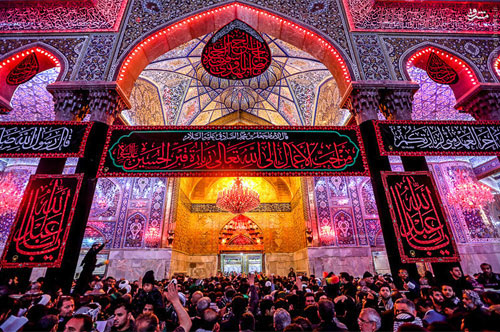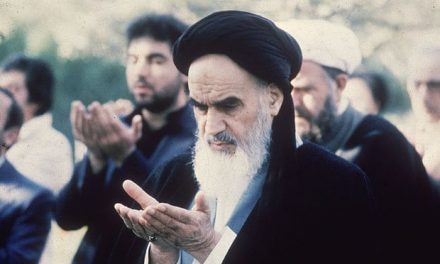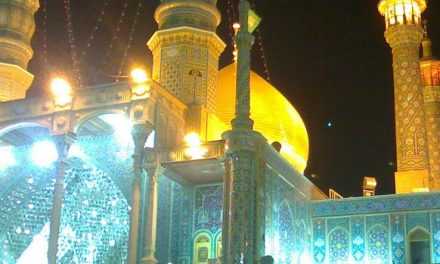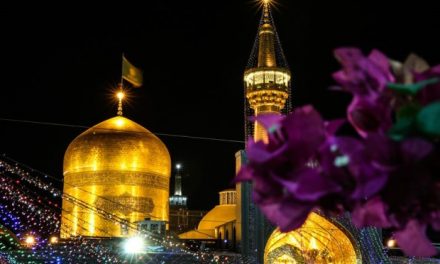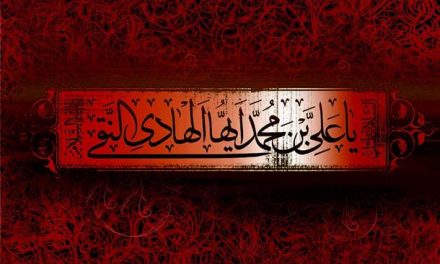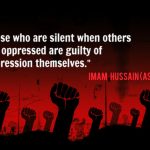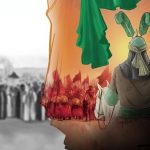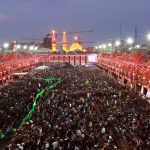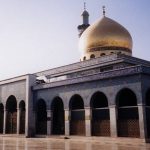Imam Hussain was born in Medina in 4 AH (626 AD). His birth was applauded by the prophetic family. The Prophet himself named him Hussain.
Imam Hussain was born in Medina in 4 AH (626 AD). His birth was applauded by the prophetic family. The Prophet himself named him Hussain. He sacrificed a ram on his behalf. On the testament of the Prophet of Islam, he and his brother are the two lords of youth of Heaven. Imam Hussain was raised under the care of the Prophet of Allah, his daughter Hazrat Fatimah, and the Commander of the Faithful Imam Ali. Imam Hussein imbibed prophetic morals and drank deeply of the Islamic principles of justice and righteousness. The Prophet used to carry him and his elder brother Imam Hassan in his arms and declare expansively in front of companions: “O, Allah, love them and love those who love them.”
Imam Hussain was introduced to the Ummah, while still in the bloom of his childhood, as a martyr. His status was identified by the Prophet of Allah lest the Ummah do him harm. Thus was Iama Hussain in the heart of the Prophet and described in his divine message. He was brought up in the noblest and most dignified house in Islam; namely the house of the Prophet. Hussain was the symbol of piety and the example of faithfulness, asceticism and worship. He was unflinching and brave in defending the Ummah and of magnificently outstanding personality. He firmly adhered to right and was strong willed and never feared the censure of any censurer in defending the divine laws.
It is because of these majestic attributes, his ingenious personality, and his lofty social rank that Imam Hussain was destined to become the dynamic, active force in the Islamic History and his life a brilliant testament leaving an indelible mark on all generations. Honor enshrined and visage of Hussein in the heart of every freedom-loving individual who knows humanity’s real worth and the merit of principle and values. The Muslims loved the household of the Prophet and revered Imam Hussain as one of the Imams from his household.
Decades passed by. The disobedient forgot the words of the Prophet of Allah regarding the high rank of Hussain. They caused grief to the Prophet by brutally killing his grandson. History provides an insight, in which one can compare two scenes; the first of which was that of the Prophet kissing Hussain on his mouth and hugging him. The second one showed, following the martyrdom of Hussain, poking the head of Hussain which had been placed in a basin.
Imam Hussain made no secret of the true motives behind his leaving Medina and why he was declaring war against Yazid. He gave unambiguously clear answers to those who wanted to know. He outlined the identity of his movement, and the principles according to which he would challenge the new Ummayad regime. All the above points were listed in a letter he sent to his brother. He underlined, further, that the deterioration of the political, social and ideological situation and his onerous responsibility for reforming the Ummah, impelled him to move and leave Medina, to lead the opposition against the new Ummayad rule.
Reviewing the Imam’s letters, arguments, sermons and correspondence, along with political, economic and social circumstances of the time, we can deduce the following realities:
- Oppression and monopoly of power on the part of the Ummayads was a fact. A distinct political class had taken shape. A tribal base party came into being, which was the Ummayd group.
- Murder, terror and shedding of blood prevailed.
- The Ummah’s wealth was wastefully spent. A capitalist class came to light besides poverty and destitution. The majority of the government officials were lacking the qualifications to discharge their duties.
- Behavioral deviation became a social phenomenon. Corruption crept steadily into public life and its symptoms appeared in both individual and group behavior.
- Law took a leave. The whims and private interests of the rulers and governors was substituted for the Sharia at critical points of the life of the Ummah.
- A group of people assigned with distorting the traditions of the Prophet of Allah and forging new, false traditions appeared. Dialectic groups such as the fatalists were formed to find suitable pretexts for the deviant political behavior of the rulers.
Imam Hossein’s letter read: “I am not taking up arms in order to make merry, or be ecstatic over what I possess, I am not making mischief, nor exercising oppression. But I am ready to fight for the sole goal of seeking reform of the Ummah of my grandfather the Prophet Allah. I want to enjoin good and forbid evil and guide the affairs of the people as my grandfather were doing.”
Source: al-shia.org

